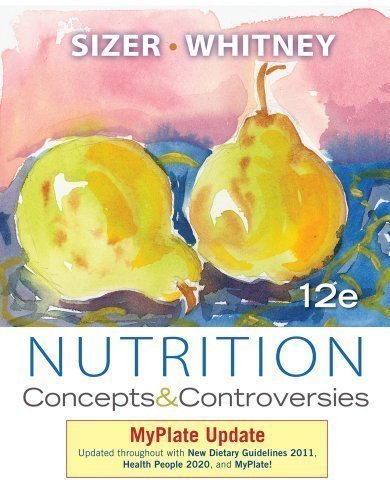Test Bank For Nutrition Concepts and Controversies MyPlate Update 12th Edition By Frances Sizer
Digital item No Waiting Time Instant DownloadISBN-13: 978-0538734943 ISBN-10: 0538734949
In Stock
Original price was: $55.00.$15.00Current price is: $15.00.
Test Bank For Nutrition Concepts and Controversies MyPlate Update 12th Edition By Frances Sizer
Chapter 2 – Nutrition Tools—Standards and Guidelines
Chapter Learning Objectives
2.1 Explain how RDA, AI, DV, and EAR serve different functions in describing nutrient values and discuss how each is used.
2.2 List the major categories of the Dietary Guideline for Americans and explain their importance to the population.
2.3 Describe how foods are grouped in the USDA Food Guide and MyPyramid.
2.4 Describe the concept of the discretionary calorie allowance, and explain how it can be used in diet planning.
2.5 Plan a day’s meals that follow the pattern of the USDA Food Guide within a given calorie budget.
2.6 Define the term functional foods, and discuss some potential effects of such foods on human health.
True/False Items
L.O.# Ans. Page #
2.1 T 30 1. So far, the DRI Committee has published recommendations for the vitamins and minerals, along with those for carbohydrates, fiber, lipids, proteins, water, and energy.
2.1 F 30 2. Currently, the DRI values for the minerals sodium and potassium, and other food constituents, are forthcoming.
2.1 T 32 3. On average, one should try to get 100% of the DRI for every nutrient to ensure an adequate intake over time.
2.1 T 34 4. The primary difference between recommendations for nutrient intakes and values set for energy intake is that the value for energy intake is not generous.
2.1 F 34 5. The DRI are international guidelines that are used around the world.
2.1 T 34-35 6. Nutrient contents of packaged foods are stated on food labels as Daily Values.
2.2 T 35 7. The United States is among many countries that establish and publish guidelines for appropriate nutrient intakes.
2.3 F 46 8. One of the major disadvantages of the USDA Food Guide is that it cannot be adapted to other national and cultural cuisines.
2.5 T 49 9. The exchange list system highlights the fact that many meats contain more calories from fat than from protein.
2.1 F 31 10. The absence of a Tolerable Upper Intake Level for a nutrient implies that it is safe to consume in any amount.
Comprehension-Level Multiple-Choice Items
L.O.# Ans. Page #
2.1 b 30, 33 1. Which of the following statements is not true about the DRI?
a. The committee that publishes them is comprised of nutrition experts.
b. They are minimum requirements, not recommendations.
c. They are based on review of available scientific research.
d. They are for individuals who are healthy.
2.1 b 31 2. If a nutrient does not have a Tolerable Upper Intake Level, this means that:
a. it is safe to consume in any amount.
b. insufficient data exist to establish a value.
c. no caution is required when consuming supplements of that nutrient.
d. it is safe when supplemental levels are added to foods.
2.1 d 31 3. Which of the following establishes population-wide average requirements used by nutrition policymakers?
a. Recommended Dietary Allowances
b. Daily Values
c. Recommended Daily Allowances
d. Estimated Average Requirements
2.1 c 31 4. The DRI Committee recommended a diet that contains _____% of its calories from carbohydrate.
a. 10-35
b. 20-35
c. 45-65
d. 50-70


Reviews
There are no reviews yet.